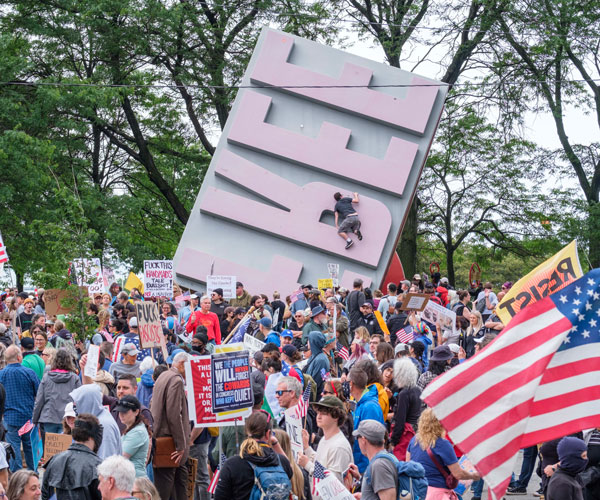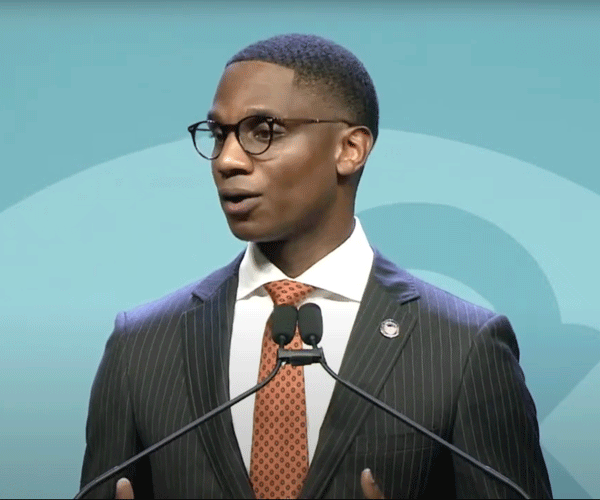Ronnie Dunn was driving home from his part-time job, feeling like all was right with the world, when the 16-year-old turned onto his street in the Mount Pleasant neighborhood. He came to a halt at the stop sign, an unremarkable bit of red on the street where he'd lived since he was 3.
As he pulled through the intersection, his rear mirror flashed blue and red. Just a few steps from his home, a police officer wrote him a ticket for running the stop sign.
"I know there was no way. I swear on a stack of Bibles to this day," he says. "I did not run that stop sign."
But the John Adams High School student fit a profile: a young, black male cruising the East Side streets.
Now, as an associate professor of urban studies at Cleveland State University, Dunn wants to start a discussion about race in a city that refuses to talk about it.
After high school and an associate degree, Dunn served in Panama with the Air Force. When he returned to Cleveland, he got a job as a blast furnace operator at Master Metals in the Flats — a lead smelter since closed for environmental infractions.
"I had to have my blood lead level tested monthly," he says. "I said, 'No, this isn't the ticket for me.' "
He enrolled at Cuyhoga Community College, where he was a classmate with former state Sen. Nina Turner, before graduating from Cleveland State University with two degrees in sociology and a doctorate in urban studies.
For much of the last 17 years, Dunn's research has focused on race in Cleveland. So when the Justice Department released a report detailing excessive use of force by the Cleveland Police Department in December 2014, Dunn recognized a glaring omission.
"I was immediately struck by the conspicuous absence of the discussion of race," he says.
Dunn wants to realign the conversation around the experience he had as a young man: racial profiling. In January, he submitted recommendations to the President's Task Force on 21st Century Policing, formed around the time of the grand jury decisions in Ferguson, Missouri, and New York. Dunn advocated for federal legislation and mandatory collection of social demographic data during traffic stops.
Dunn was also appointed to Gov. John Kasich's task force on community-police relations. The group first met Jan. 20 and has visited four Ohio cities on a listening tour through mid-March. Along the way, Dunn has heard a constant drumbeat of mistrust between police and residents.
"People are angry," he says. "They're frustrated, they're hurt, they're upset."
At a Toledo forum in late February, Dunn heard the story of a black female police sergeant who approached every stop as if her life was in danger. "I understand the inherent danger and uncertainty in policing, and they have the right to go home at the end of their shift," says Dunn. "But so does the public have that same right and expectation. Therein lies the problem."
In his 2011 book Racial Profiling: Causes and Consequences, Dunn analyzed traffic ticket data from April 1999 to May 2001 and found that blacks were more than twice as likely to be ticketed as whites in Cleveland. His study sparked the installation of traffic cameras as a more objective means of law enforcement, which were effectively neutered in last year's election.
Racial profiling legislation could bring similar objectivity. "You lay a foundation and try to create an environment wherein law-abiding citizens of any background know their rights aren't going to be violated based on some social variable or characteristic," says Dunn.
In 2007, City Council commissioned Dunn to study the effectiveness of the Cleveland Police Review Board. After surveying people who had filed complaints with the board, he found that 83 percent of respondents did not feel their complaint was fully investigated. The same percentage was not kept aware of the status of their complaint.
In an eerie foreshadowing of the Justice Department report, he wrote, "The effectiveness of the Cleveland Police Review Board, one of the oldest in the country, appears to be more symbolic than substantive in providing public oversight and greater police accountability."
If there were a place and time for comprehensive reform, it would be here and now. Yet there is little political will to face racial issues head-on. "To some degree, our elected and appointed officials have gotten comfortable and are not willing to address a lot of these tough issues," says Dunn.
Nonetheless, Dunn thinks the moment is right for political action to bring about greater transparency. "Given where we are both locally and nationally, we've finally reached a tipping point," he says. "There will be some change, substantive change, that results from all of this."



